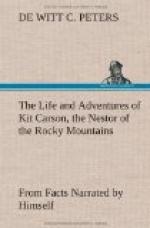met with ample rewards for their labors. The frontiers
were like the olden sea coasts. The Mexicans kept
out scores of custom-house officers to guard their
frontiers, but the shrewd foreigners, many times,
were able to escape them; at others, they were so
fortunate as to find that a bribe would answer as well.
An old trick was to have a double bottom to a wagon,
and, in the vacant space thus formed, were stowed
valuable shawls and such light articles as would meet
a sure and remunerative sale. Sometimes the goods
were brought near the frontiers and there hidden in
the ground until a favorable opportunity offered to
steal them into the country. When there was great
danger that these secreted goods would be discovered,
the smugglers would so arrange a keg of powder with
a loaded pistol pointing at it, with strings running
to the shrubbery near by, so as to cause it to explode
and kill the searchers should the bushes about be
disturbed. One old smuggler once fixed things
in this manner, but performed his task too well; for,
on going to remove his property, he came very near
blowing himself up, as the mine was sprung and he was
thrown in the air, but miraculously escaped. Many
of the adventures of these men would be interesting;
but they are too voluminous to be embodied in our
work. The valley of Taos is well watered by mountain
streams which flow into the Rio Grande. On one
of these creeks and near the mountains, to the east
of Fernandez de Taos, is located an Indian Pueblo
which is very interesting to the traveler. Its
houses are built one on top of another until a sort
of pyramid is formed. The people enter their
respective domicils through the roofs, which form
a kind of steps. At the foot of this queer building
there is a church; and around, the scenery is very
picturesque, as the whole is bounded on one side by
a gap in the mountains, while on the other is the open
valley. This band of Indians at first offered
great resistance and fought with much bravery against
the United States; but now they are counted among
its most faithful allies, and are great in their admiration
of Kit Carson. The farming utensils of the New
Mexicans are rude in the extreme; but the agricultural
implements of the Anglo-Saxon are slowly replacing
these articles. The old plough, as frequently
used at the present time by the New Mexicans, is indeed
a curiosity, as it probably was invented in the earliest
times. It consists of one piece of timber which
is crooked the proper shape by nature; the end of
this is sharpened, and on it is fastened a single
piece of iron which has an attempt at a sharp point.
The force to propel this farming implement is attached
in the usual way, with but few modifications.
Oxen are always employed in this labor, and their
yoke is fastened after the Egyptian fashion, to their
horns instead of by bows. In breaking up the
hard prairies, this plough had a difficult task to
perform and was often broken; but, by the assistance
of men employed in clearing obstacles, such as sage




